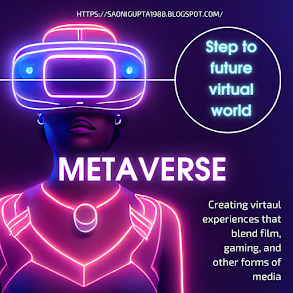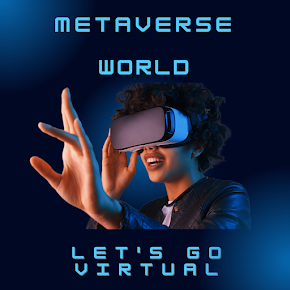Metaverse: The Digital Futureland
The concept of the metaverse has been around for several years, but recently it has gained a lot of attention due to its potential to revolutionize the way we interact with the digital world. Simply put, the metaverse is a virtual world where people can interact with each other and digital objects in a seamless and immersive way. In this blog post, I will explore what the metaverse is, how it works, and its potential impact, uses and implications on our lives.
What is the Metaverse?
Science fiction novelist Neal Stephenson initially used the word "metaverse" in his 1992 book Snow Crash. In the book, the metaverse is a virtual world where people can interact with each other and digital objects using avatars. In today's context, the metaverse refers to a collective virtual shared space that is created by the convergence of the physical and digital worlds.
The metaverse is not just a single virtual world but rather a collection of interconnected virtual worlds, each with its own set of rules, economies, and social norms. In the metaverse, users can move seamlessly between different virtual worlds and interact with other users and digital objects in real-time.
How Does the Metaverse Work?
The metaverse is powered by a combination of technologies, including virtual reality (VR), augmented reality (AR), and blockchain. These technologies enable users to interact with the virtual world using avatars, haptic feedback devices, and other immersive tools. In addition, blockchain technology provides a decentralized and secure way to manage digital assets, such as virtual currency and virtual real estate.
The metaverse is not just a passive environment, but rather an active one where users can create and own digital assets, such as virtual clothing, furniture, and even virtual real estate. These digital assets can be bought, sold, and traded just like physical assets, creating a virtual economy that operates in parallel to the physical economy.
Potential Impact of the Metaverse
The metaverse could become a new form of social media where people can interact with each other in a more immersive and personal way. It could also become a new form of entertainment where users can participate in virtual concerts, sporting events, and other experiences.
In addition, the metaverse could have significant economic implications. It could create new jobs and industries, such as virtual real estate development, virtual event planning, and virtual asset management. It could also create new forms of value, such as virtual currencies and digital assets.
However, there are also concerns about the metaverse, particularly around issues of privacy, security, and ownership. As the metaverse becomes more integrated into our lives, it will be important to ensure that users' rights are protected and that the metaverse operates in a fair and transparent way.
Uses of the Metaverse
One of the most exciting aspects of the metaverse is its potential to be used in a wide range of industries and applications. Here are a few examples:
Gaming: The gaming industry is already making use of the metaverse, with virtual worlds such as Second Life and Roblox allowing users to create and share their own games and experiences. The metaverse could potentially be used to create even more immersive and engaging games.
Education: The metaverse could be used to create virtual classrooms and training environments, allowing students to learn in a more interactive and engaging way. It could also be used for distance learning, enabling students from all over the world to attend classes together..
Healthcare: The metaverse could be used to create virtual hospitals and clinics where patients can receive medical care without leaving their homes. It could also be used for medical training and simulations, allowing healthcare professionals to practice their skills in a realistic and safe environment.
Social Media: The metaverse could become a new form of social media where people can interact with each other in a more immersive and personal way. It could also be used for virtual events, such as concerts and conferences.
Implications of the Metaverse
While the metaverse has the potential to bring about many positive changes, there are also concerns about its implications. Here are a few examples:
Privacy: As the metaverse becomes more integrated into our lives, there are concerns about how our personal data will be collected, used, and protected. It will be important to ensure that users' privacy rights are respected and that they have control over their own data.
Inequality: The metaverse could potentially exacerbate existing inequalities, as those with more resources and access to technology may have an advantage over those who do not. It will be important to ensure that the metaverse is accessible to everyone and does not create new forms of inequality.
Ownership: As the metaverse creates new forms of value, such as virtual currencies and digital assets, there are questions about who owns and controls these assets. It will be important to establish clear rules and regulations around the ownership and control of virtual assets.
Metaverse Myths
While the concept of the metaverse is exciting and holds immense potential, there are several myths about it that need to be debunked. Let's take a look at five of the most common myths about the metaverse.
Myth #1: The metaverse is just a video game.
The metaverse is much more than just a video game. It's a virtual world where people can work, learn, socialize, and create. While gaming is certainly a big part of the metaverse, it's not the only thing that the metaverse is capable of.
Myth #2: The metaverse is only for young people.
The metaverse is for people of all ages. In fact, many older adults have already embraced the metaverse as a way to stay connected with family and friends and to engage in lifelong learning opportunities.
Myth #3: The metaverse is only for tech-savvy people.
While it's true that the metaverse requires a certain level of technical know-how, it's becoming more user-friendly and accessible with each passing day. As the metaverse becomes more mainstream, it's likely that it will become even more intuitive and easy to use.
Myth #4: The metaverse is a replacement for the real world.
The metaverse is not a replacement for the real world but rather a complement to it. While it can provide an immersive and engaging experience, it's important to remember that the real world still exists and that it's important to balance virtual experiences with real-life ones.
Myth #5: The metaverse is the answer to all our problems.
While the metaverse holds immense potential, it's not a magic solution to all of our problems. It's important to approach the metaverse with a critical and thoughtful perspective. By doing so, we can unlock the full potential of the metaverse and create a virtual world that enhances our lives in meaningful and positive ways.
Conclusion
The metaverse is a complex and multifaceted concept with many potential uses and implications. While there are still many questions and concerns about the metaverse, it is clear that it is an area of rapid development and innovation. As we move into the future, it will be important to continue exploring the potential of the metaverse and to ensure that it is developed in a way that creates a metaverse that is fair, equitable, and beneficial for everyone.







Metaverse's Multiverse 🤘
ReplyDeleteThank you !!! ❤️
DeleteVery good 👍
ReplyDeleteThank you !!! ❤️
Delete